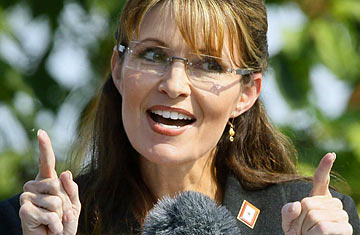
Sarah Palin in Fairbanks, Alaska, on July 26, 2009
Around the time of the publication this past November of Sarah Palin's book Going Rogue, John McCain convened an unusual conference call with the former top staffers of his 2008 presidential campaign. McCainworld had been braced for the Palin tome for months, fearing she would use it to settle scores against a group of aides she had turned against — and vice versa. On the call, however, McCain implored his people to refrain from comment on the book. He had no appetite for an ugly public airing of his campaign's most heavily soiled laundry.
The former Alaska governor's memoir did, in fact, outrage many people involved in the McCain-Palin operation. They saw in the book an array of the same qualities they had come to discern in her during the two months of the general election: the self-serving habits, the vindictiveness, the distant relationship with the truth. For McCainworld, all the old feelings toward Palin came back in a rush. But except for chief strategist Steve Schmidt's concise dis of the book ("fiction") and communications adviser Nicolle Wallace's somewhat more lengthy refutation on The Rachel Maddow Show, virtually everyone else in the McCain-Palin orbit abided by the Senator's wishes — keeping the secrets of the campaign secret.
Until this week, that is. With the publication of our book Game Change and the appearance of Schmidt on 60 Minutes in a piece discussing our reporting, much of the truth about Palin has begun to emerge. The questions are how she might respond and what effect the turn of events will have on her future — a future that now includes a gig at Fox News.
The picture presented in Game Change of Palin's emergence as national phenomenon — and the real Palin behind her public persona — is often startling and sometimes shocking. The scantness of the vetting she received before being placed on the Republican ticket. Her substantive deficiencies, even more dramatic than those that had previously been reported: her lack of understanding about why there are two Koreas, her ignorance about the function of the Federal Reserve, her belief that Saddam Hussein was responsible for 9/11. The fact that, at her lowest moments during preparation for her debate against Joe Biden, some senior McCain aides worried that she was mentally unstable. And, ultimately, their fears that she wasn't up to the job of being Vice President.
Adding to the picture are the revelations that Schmidt brought forward on 60 Minutes — in particular, her habitual shading of the truth in ways that exposed the campaign to extreme political vulnerability. "You know, it [was] the equivalent of saying down is up and up is down," Schmidt told Anderson Cooper on the program. "[She routinely said things] that were provably, demonstrably untrue."
That other McCain aides have kept quiet for so long about the real Palin owes to two factors. The first is loyalty to McCain. With his hatred of infighting, desire to put the campaign behind him and perhaps awareness of his complicity in foisting Palin on the world, the erstwhile Republican nominee has encouraged his people to stifle their criticisms of her and play down their disagreements with her, even though the direction for the party that Palin represents is diametrically opposed to McCain's vision.
But the second reason is equally significant: the fear of the Palin forces. Intimidated by the rabidness of her supporters, believing that they can't be swayed by facts and worried about getting crosswise with the most highly energized part of the Republican base, McCainworld has shied away from fighting for the soul of the party, instead allowing her version of reality to go largely unchallenged — and her rise to continue unchecked. There was perhaps a related factor: a recent ABC–Washington Post poll found that Republicans regard Palin as the 2012 front runner for their party's nomination and that she best represents the GOP's values — besting McCain himself on that score, 18% to 5%.
The question, however, is what will happen now that the omertà has been broken. So far Palin has not responded (beyond a blanket nondenial denial) to the facts about her in Game Change or the views offered on 60 Minutes by Schmidt. But with her new Fox contract making her a professional TV talking head, Palin may soon have no choice but to engage with her critics — an engagement that may well embolden them in ways that threaten her public image more than anything else so far.
Game Change (HarperCollins), by Mark Halperin and John Heilemann, is available now.
